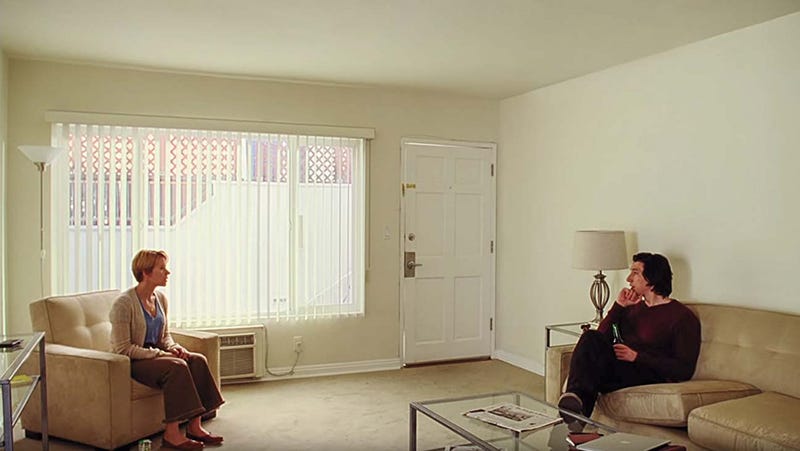Cryin' Time
Marriage Story is a divorce story and that's bad. But it could be worse.

Marriage Story, the highly-touted Noah Baumbach movie about two New York arty-farties getting divorced, reminded me and a lot of other people of Kramer vs. Kramer, the Robert Benton divorce drama that won the Best Picture Oscar in 1979. Of course a lot has changed culturally in the intervening 40 years; for obvious reasons the wife can’t be the sinister gnome Benton and Meryl Streep made her, existing mainly to put Daddy and his Little Boy through the cleansing fire; mom gets much more play here, and in fact Baumbach gives her superlawyer Laura Dern a big womyn-affirming speech (mainly, I truly believe, to make sure everyone knows he’s not that kind of a male auteur, and also to goose Dern’s Oscar chances).
Still, my mind kept lining the two movies up while I was watching, and it was not a favorable comparison on either side. I never liked Kramer vs. Kramer; I admire its privileged moments — Marriage Story has some good ones of its own — that are more about showing relations than advancing the plot, like when the kid won’t eat dinner and gets the ice cream (“I hate you back, you little shit!” is my favorite line in that movie by far.) But the story’s loaded up with a kind of bitter angst that even in 1979, way before I’d had a chance to be divorced myself, I sensed was a bit histrionic and self-serving. Today, having been through several mills romantically, I still feel that way; maybe you have to be smack dab in the middle of a divorce, or unhealthily obsessed with an past one, to feel as if the process and the changes it can ring are worth two hours of anyone else’s time. Otherwise it just seems a bit much.
And I felt the same way about Marriage Story, at least till near the end, when it dawned on me what was happening. It doesn’t help — at least at first — that Charlie and Nicole aren’t really very interesting or likable. They’re glamorous, because they’re played by the beautiful Adam Driver and Scarlett Johansson, and because their characters are successful New York theater artists. But this ain’t All About Eve and Baumbach isn’t into Mankiewiczean wordplay; these guys are very deep into their feelings, and even worse are deep into their feelings for a living, which leaves very little room or capacity for wit. Maybe in rehearsals they’re rhapsodic, but as it is the two sound like well-educated and even sensitive people who have nonetheless never discussed anything more elevated than what restaurant they’re going to go to.
Which is not to say that the dialogue’s bad; actually it’s pretty great, because over time you realize the banalities Charlie and Nicole mouth are every bit as much a facade as wittier, more artificial-sounding dialogue would have more obviously been. They have to get started on the divorce and let it scrape at their surfaces awhile before you begin to see what’s eating them. There’s a wonderful scene where Alan Alda, brilliant as the low-key let’s-be-friends lawyer Charlie hires at first, is telling him a long, funny story to explicate some point about the vagaries of divorce, and we see Charlie, who has just been blindsided in a legal conference, noticing the clock (and, it’s implied, his lawyer’s hourly rate), then exploding with an angry demand to know if he’s paying for this joke. This is one of the first in a series of moments in which both characters find that the divorce that they originally conceived as an amicable process is actually rather brutal, and requires brutality from them — because, they and we further learn [I suppose this is a spoiler], they have come to hate and are killing each other. The much-memed scene where they finally get desperate enough to say it out loud to each other is the best thing in the movie — not only world-class acting but also believable no-bullshit marital fight dialogue.
And that’s a kind of eloquence — Baumbach’s and the film’s, not Charlie’s or Nicole’s. We see it also in the framing device [here’s another slight spoiler] — a counselor’s therapeutic assignment for each of them, early in the divorce process, to write out what they love about each other. In the opening reading, in voiceovers, they’re cute, devotional (and helpfully expository) catalogues; in the end, they’re reminders of what got lost.
That’s poignant but, again, this is a divorce saga, and it may chafe you as it did me in the longueurs; there are attempts to wring domestic humor that are just cringe (though Martha Kelly as the literal-minded “evaluator” a court sends to observe Charlie and the kid at dinner is hilarious), and when Charlie does a lengthy karaoke “Being Alive,” all I could think was, wow, Adam Driver has such a great voice, who knew, I wish I was watching Company right now. Also, Randy Newman’s orchestral score is pretty and reasonably apposite but seems like a miscalculation, an attempt to slather some old-fashioned movie grandeur on what in the end is a pretty modest indie-style relationship picture — albeit one where the relationship is over before the picture begins.

Best capsule review ever:
"What's Eating Gilbert Grape" was playing on HBO. My girlfriend's dad yelled, "What is this goddamn fascination with dysfunctional fucking families?" as he stomped out.
“Art? I thought we were talking about movies...”-“Doonsbury”